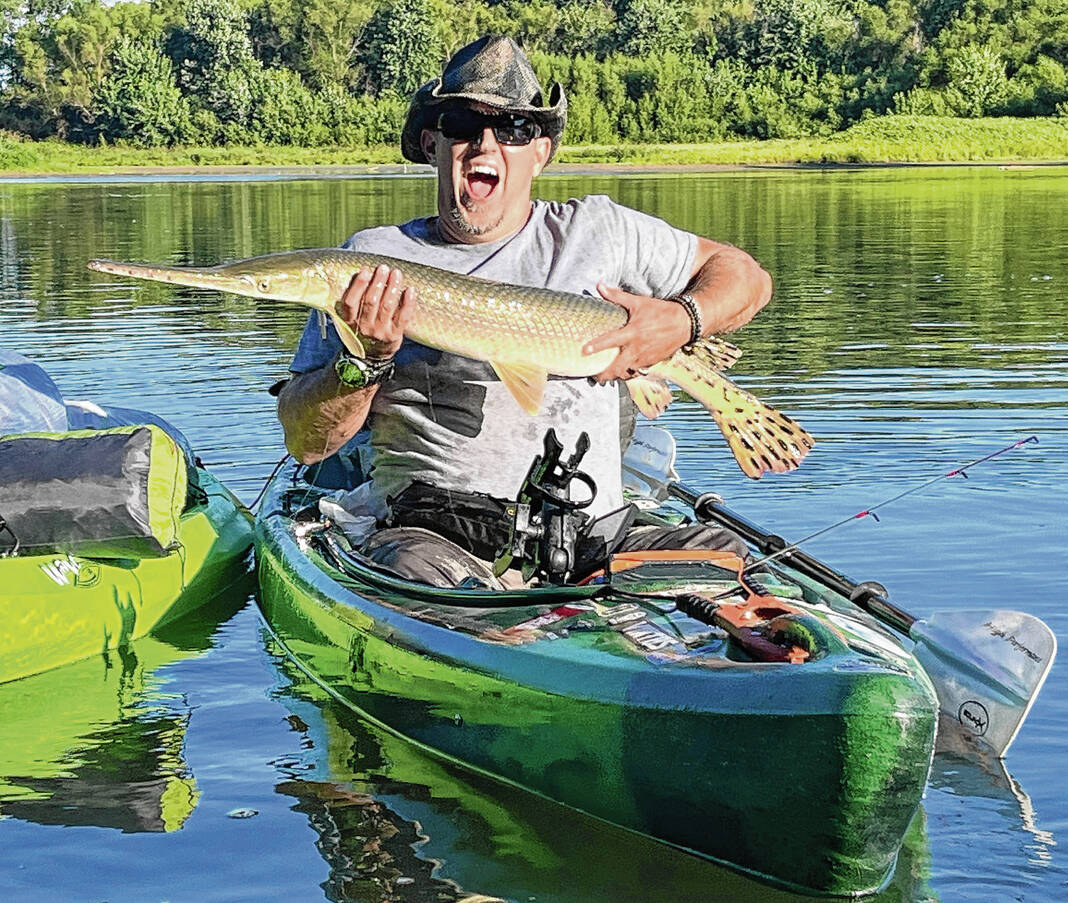
In between strokes in the waters of the White River, Toby Stigdon, here displaying one of many fish caught, the paddlers cast for whatever would bite.
Submitted photos
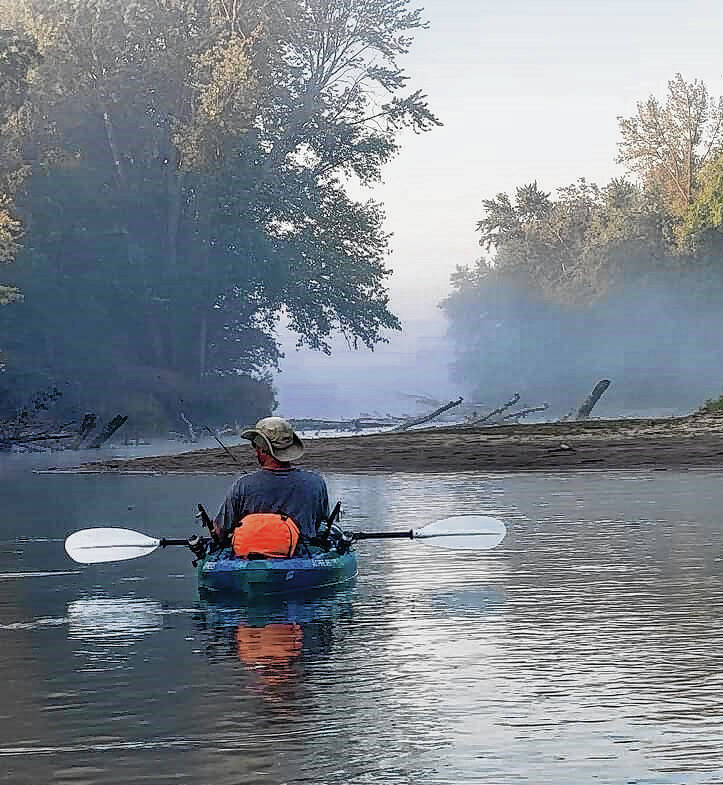
Mostly, the paddlers traveled in sunshine with very occasional rain, but sometimes, the sky was thick with mist.
Submitted photos
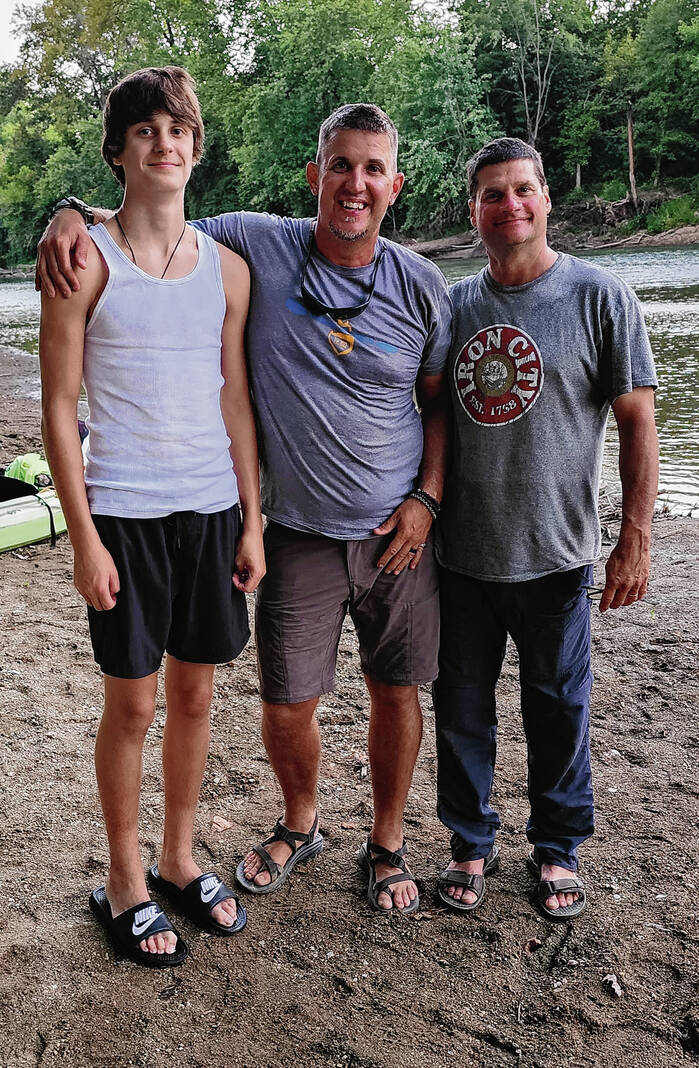
Toby Stigdon’s 14-year-old son, Chase, left, was able to join him and partner Greg Foley for part of the 200-mile Kayaking for Cancer paddle that raised $21,000 for the Schneck Foundation.
Submitted photos

Occasionally, the paddlers encountered unexpected wildlife, such as this extra-large turtle, as they traveled the White River.
Submitted photos
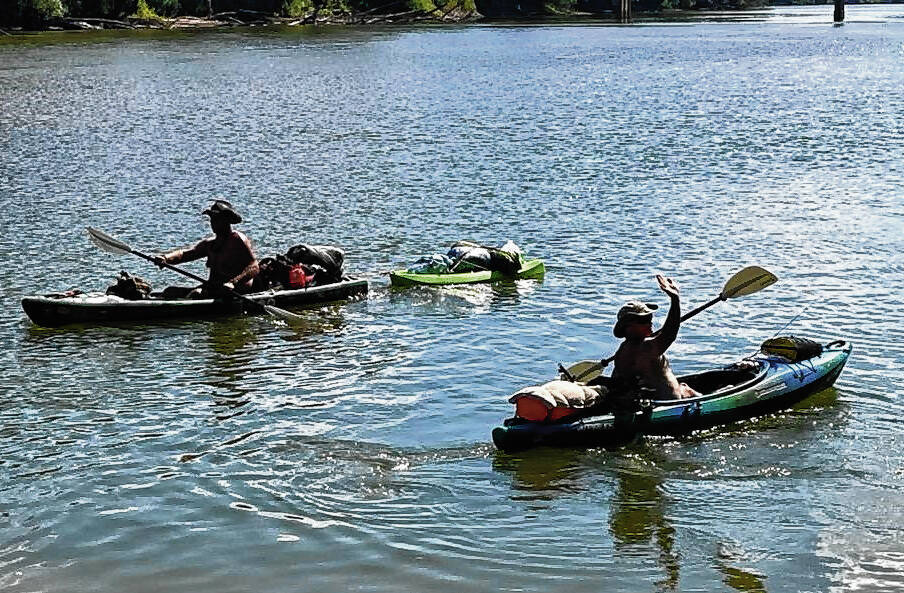
Greg Foley and Toby Stigdon push off on one of the legs of their 200-mile Kayaking for Cancer paddle between Columbus and Petersburg from Sept. 1 to 8.
Submitted photos
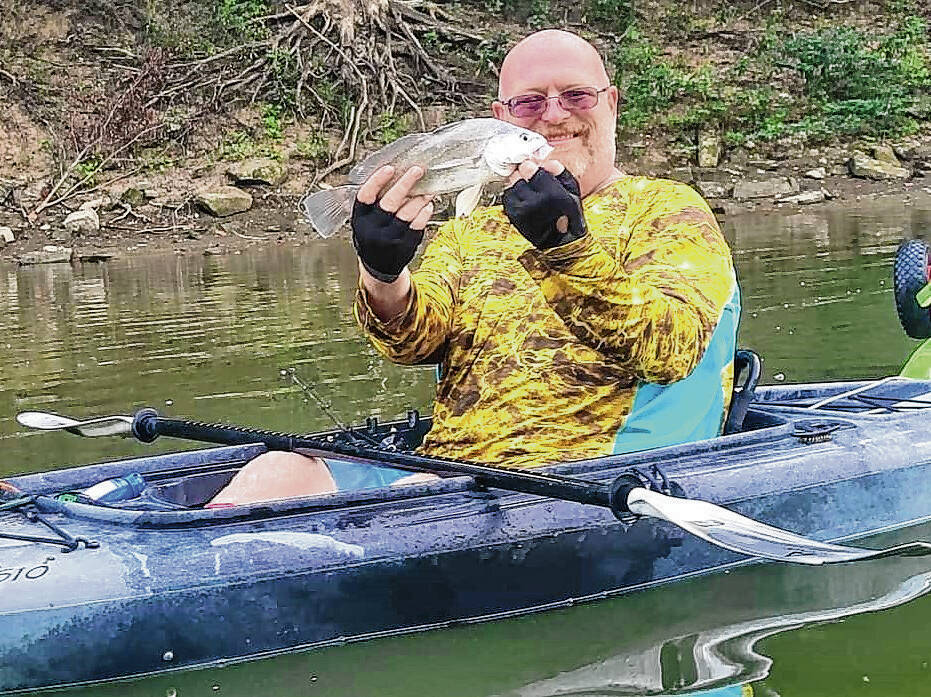
Toby Stigdon’s cousin, B.J. Strong, who traveled partway, holds a fish he caught on the White River while paddling.
Submitted photos
About seven days into their 200 miles on the East Fork of the White River, when Toby Stigdon was soaked from the rain, his neck and shoulders aching from paddling his kayak, and the day lengthening beyond 10 hours, he hit a roadblock of discouragement.
Then he paddled on. He couldn’t stop. He couldn’t drop out. He, his family, friends and others were counting on him.
And when Greg Foley hit his own wall, he persevered and paddled onward to the finish line meeting of the East Fork and the West Fork of the river near Petersburg in Pike County
“Cancer patients don’t get to quit,” Foley said.
Paddlers completed the second Kayaking for Cancer fundraiser Friday afternoon, eight days after they set out in Columbus. They were weary and hungry, but grinned with a sense of great accomplishment, turning an outdoor endurance sporting endeavor into $21,000 for the Schneck Foundation at the Schneck Medical Center in Seymour.
The year before, Stigdon and Foley were part of a small group of kayakers covering 73 miles on the river from Columbus to Sparksville, raising $28,000.
“I am so proud of everybody rallying together,” said Stigdon of the community people contributing the money because of this longer, 204-mile run.
Stigdon, 43, lives in Columbus, but is from Seymour. He has been given a terminal cancer diagnosis from poorly differentiated thyroid cancer. Married to Samantha, and father of Chase, 14, – who paddled a leg with his dad — and Olivia, 9, Stigdon works at the Montessori school in Columbus.
Rather than raise money for his own treatment, which is covered by insurance, Stigdon linked up with Schneck to raise money through these kayaking adventures. The proceeds go to those in need of financial help at the Don and Dana Myers Cancer Center, covering gaps in coverage such as transportation.
What Stigdon initiated as a one-time program in 2022 expanded to a longer paddle this year because Stigdon’s health was stable enough to attempt a longer distance.
“I wanted to push my body to see what I can do,” said Stigdon, who maintained his stroking weight at around 230 pounds.
In partnership with Foley, 53, who lives in Seymour and works in Columbus, and Stigdon’s cousin, BJ Strong, 44, of Georgetown, who briefly participated last year, but who covered about 100 miles in four stages this time, Stigdon discovered maybe he has hit his limit.
Paddling for 10-to-12 hours daily for eight days and living mostly on energy bars and water, Stigdon lost 12 pounds. Many nights, Stigdon said, he and Foley found a pullover spot, put up tents and rather than chat by a camp fire, or cook, just fell asleep.
“We were just dead tired,” Stigdon said. “It was just paddle, paddle, paddle.”
Raising money for others
The Kayaking for Cancer idea stemmed from Stigdon’s shocking 2021 diagnosis and doctors telling him he had a finite time to live.
Stephanie Flinn, executive director of the Schneck Foundation, has praised Stigdon for his unselfishness and generosity. Stigdon said he sometimes encounters people skeptical that he receives none of the money collected. But it all goes to Schneck.
Over the last two weeks before the paddlers began Sept. 1, and over the week they were gone, the amount contributed grew from $7,500 to $21,000. A chunk of that was gathered at a pre-paddle launch party at Brooklyn Pizza’s Harmony Park in Seymour.
“People helping people is a motivator,” Flinn said. “Toby came to us with the idea two years ago. He has certainly been passionate about it and I think it has given him a little bit of a boost.”
Some days before the start of this paddle, Stigdon said treatments have stabilized his tumors – at least for now.
Last year, the paddlers, including Rex Thompson and BJ Strong, Stigdon’s cousin, of Georgetown, pushed off on the water with great fanfare from a launch party. This year the events were separated. Stigdon, Foley and Strong started from a somewhat secluded boat ramp in Columbus, gathering in the dark and setting out just past sunrise with only three eyewitnesses.
Strong felt he corrected a mistake of 2022.
“I packed a lot lighter and more efficiently,” he said.
Strong paddled two days early on the trek and two days near the end and in-between stopped to help with re-supply at the end of paddling days, each planned to cover about 25 miles.
Keli Foley, Greg’s wife, was a ride-along support crew assistant and she made peanut butter and jelly sandwiches to aid caloric intake and dropped off oranges, grapes and other fruit snacks.
The first two days were the hottest of the journey, at least once hitting 90 degrees. At the conclusion of the long hours of paddling, Stigdon said he and Foley pretty much conked out in their tents. “We were pools of sweat,” he said.
One unexpected aspect traveling was the wind almost always being in their faces. Even if one gazed high to the treetops and didn’t see a ripple of a breeze, there was some wind blowing at them at surface level on otherwise calm waters.
“There were some serious challenges,” Greg Foley said. “We didn’t do it as a vacation.”
Periodically, in addition to the Keli Foley peanut butter specials, another friend or family member would find the riverside camp du jour and visit with food. An uncle showed up with homemade meat loaf. A Stigdon cousin appeared with a double cheeseburger, which rated as high with as any Michelin restaurant.
Amusing themselves as they went, or when taking a break, Stigdon, Strong and Foley, as they did last year, indulged in fishing. Stigdon was pleased and surprised when he hooked a couple-foot-long gar.
“I always wanted to get one,” Stigdon said. And while trying to land the gar, “I was trying to stay out of the way of its teeth.”
The men never positively knew where they were going to camp each night. They searched for sandbars and took what the river offered. Sometimes when ready to stop for the night there was no suitable place to plant their one-man tents and they had to go on for extra tiring miles.
200 miles is plenty
Bodies and minds were wearing down near the culmination of the 200 miles.
“We each had a low-day meltdown,” Foley said. “We were there for each other, though. We said, ‘Nah, we got this.’” And they continued on, covering 30 miles on the seventh day.
As the paddlers approached Petersburg, Stigdon’s tent broke.
“Toby was a trooper,” Foley said. “He slept in his kayak wrapped up in a tarp.”
Foley is originally from Pittsburgh, and frequently wore an “Iron City Beer” T-shirt, advertising a prominent regional brand. Along the way he also snapped a photo of a power plant and said his brother began calling him “My iron man.”
Foley was glad to hear the fundraising reached $21,000 while the paddlers were gone.
“That’s amazing,” he said.
Prior to this trip, the optimistic Stigdon, thinking ahead about his own health status and Kayaking for Cancer, talked of a still longer run next year from Petersburg to the Mississippi River.
That suggestion, Foley said, is shelved. If they learned one thing from this year’s paddle, it’s that 100 miles of paddling to make a point in fundraising, and for their bodies, is sufficient.
The paddle finished about 3 in the afternoon, but neither Stigdon nor Foley collapsed into long sleeps. Stigdon rose at 7 a.m., Saturday, “still on river time,” he said.
Foley joked that he awoke thinking, “Where’s my paddle?”
He also said his next task was to mow the lawn, taking him back to real, daily life.
As for Stigdon, he said he plans to park his kayak, at least for a few months and sleep under his own roof.
